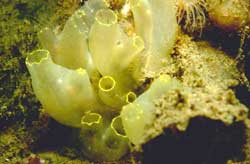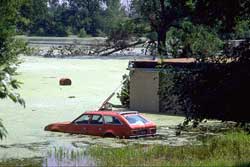Rocks deposited by glaciers on mountain ranges in West Antarctica have given scientists the most direct evidence yet that parts of the ice sheet are on a long-term, natural trajectory of melting.
The West Antarctic Ice Sheet has been melting and contributing water continuously to the ocean for the last 10,000 years and is likely to keep doing so, says John Stone, University of Washington associate professor of Earth and space sciences.
Measuring and understanding changes in the Eart
Scientists are still learning what’s in a drop of ocean water, according to this week’s Nature Magazine. And the answers have implications for the whole planet, says co-author Craig Carlson, an oceanographer at the University of California, Santa Barbara. Carlson is an assistant professor in the Department of Ecology, Evolution and Marine Biology.
About ten thousand bacterioplankton of the type SAR 11 are found in every drop of seawater. And yet, as explained in the article, which
Using models that simulate the interaction between global climate and land ecosystems, atmospheric scientists from the Lawrence Livermore National Laboratory have shown that compensating for the carbon dioxide “greenhouse effect” by decreasing the amount of sunlight reaching the planet (geoengineering) could create a more vigorous ecosystem while helping to curb global warming.
The study suggests that planetary-scale engineering projects to lessen the amount of solar radiation reaching the

Genome of Ciona intestinalis yields new insights into the origins of complex biological systems
The streamlined genome of Ciona intestinalis, a common sea squirt closely related to vertebrates on the evolutionary tree, is providing new clues about the origins of key vertebrate systems and structures including the human hormone, nervous and immune systems.
In an article for the December 13, 2002 issue of the journal Science, an international consortium of researchers reports

The broad-scale warming expected from increased greenhouse gases may actually sap the strength of a typical El Niño, according to researchers at the National Center for Atmospheric Research (NCAR) in Boulder, Colorado. In contrast, the average El Niño during the last ice age may have packed more punch than today’s. The scientists have examined the past and future behavior of El Niño using a sophisticated computer model of global climate. They present their results this week at the annual meeting
Nearly a month has passed since the wounded tanker Prestige spilled thousands of tons of heavy oil into the Atlantic and fouled dozens of Spanish beaches. But anxious residents of coastal Spain and Portugal remain on high alert – wondering where and when the noxious crude will wash ashore next.
In recent years, tanker accidents have ruined fisheries and tourist beaches from Alaska to France. But do oil spills always have to end in catastrophe? Perhaps the most vulnerable beaches and coastal